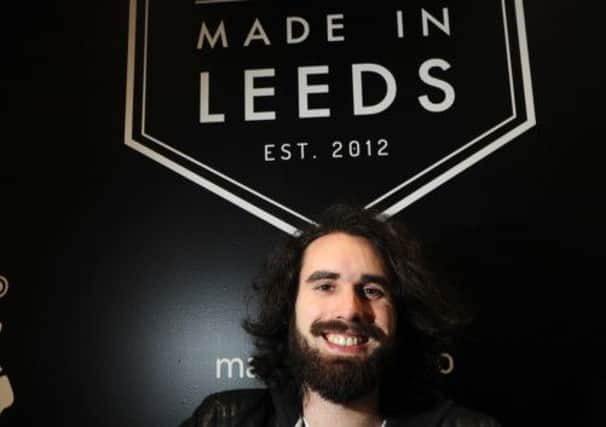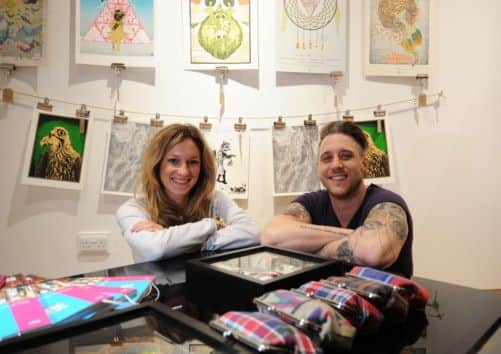In praise of Yorkshire’s textile heritage as store showcases the best of the new


When we think about the textile industry in West Yorkshire we remember a once-thriving enterprise now mostly consigned to history. The onward march of progress and the general decline of northern industry over the past 100 years has seen the factories of Taiwan, China and South Korea taking the place of region’s big mills and artisanal workshops.
But nestled in the heart of a landmark retail regeneration project, Trinity Leeds, is a new store designed to buck that trend. The Made in Leeds shop is the joint project of Rabbit Hole Designs and creative consultancy Hebe, it’s aim to showcase the best and brightest of Leeds-based fashion.
Advertisement
Hide AdAdvertisement
Hide AdThe product of three years’ work to promote the independent brand, the shop will display and sell exclusively local products made by the city’s artists.


“Part of this project is based on the idea that there is a market – or hunger – for locally designed and manufactured projects, which is why we wanted to get into Trinity and be alongside chain brands so hopefully people decided to buy locally sourced brands,” says Mark Martin, creative director of Rabbit Hole.
“We are trying to give local textiles, art and music the biggest platform we can and let the people of Leeds know there is this vibrant scene right on their doorstep.
“We want to make people aware of the international stage this movement is operating on.”
Advertisement
Hide AdAdvertisement
Hide AdLeeds has always had a strong showing from the independent sector with a strong presence in the city centre, both at the historic Corn Exchange and the surrounding Kirkgate area and the trend may just be spreading.
The decline of the British high street has dominated headlines since the start of the recession with household names like Woolworths, Peacocks and HMV going into administration, but in Yorkshire at least the picture is rosier.
At the beginning of the month, the flagship Portas Pilot scheme to regenerate high streets, launched by the Government and TV retail guru Mary Portas last year, came under criticism for a lack of progress and waste in some of the projects in the North.
A pre-Budget report showed unemployment actually rose by 7,000 nationally over the last quarter even though it is still down 152,000 since this time last year.
Advertisement
Hide AdAdvertisement
Hide AdBut although Government attempts to revive the high street seem to be stalling, local projects and start-ups seem to be defying the economic downturn.
According to the Office for National Statistics, there were 16,600 new businesses “born” in 2010, accounting for 10.2 per cent of all businesses in the region. In 2011, new businesses accounted for nearly 10.5 per cent of all companies in Yorkshire and Humber.
Martin thinks the move to online shopping among the big name chain stores has created an opportunity for bespoke, local brands to shine and give Leeds its own identity on the high street.
“Obviously we have nothing against all the other shops they’ve got in there but they’re chain shops and you can get them in other cities, you know everyone’s seen a Primark,” says Martin. “But no-one outside Leeds, or even in Leeds, has seen what we’re doing with Made in Leeds, wholly focused on things that were actually designed here.
Advertisement
Hide AdAdvertisement
Hide Ad“We are definitely seeing a trend towards people wanting to shop at independents and the enthusiasm for cool little pop up stores even in the run-down areas.”
Made in Leeds is just one of the 120 shops in the Trinity Leeds complex which, at more than a million square feet, is now the largest shopping and leisure complex in the UK.
While most of the units are occupied by high street names, being in the same location as the likes of Mango, Next and River Island should help to guarantee a steady flow of potential customers for the Leeds outlet.
Martin admits the reason for their Trinity Leeds location is simple – “the massive footfall and to get as big an audience as possible for local art”.
Advertisement
Hide AdAdvertisement
Hide AdHe adds: “We decided to start up this project because we knew so many people doing such great things that maybe a lot of people did not know about.”
The store was launched as a pop up in Leeds’s Corn Exchange last December to great success and there appears to be growing enthusiasm for the project.
“Everyone we speak to wants to know more, everyone is very keen to get involved,” says Martin. “All we ever hear is ‘that’s such a great idea’.”
The shop is the next stage of an ongoing attempt to get Leeds textiles, art and music scene recognised on a local, national and international stage.
Advertisement
Hide AdAdvertisement
Hide AdOver the past few years, Hebe has put exhibitions on in Barcelona and its head of fashion, Shang-Ting Peng’s UK Observing Diary blog about the Leeds and London fashion scene has become widely read in the Far East.
The aim is to bring the underground currents of culture bubbling to the surface and demonstrate Leeds’s zeitgeist. The first store will be five by five metres and employ six people, but they hope they may be able to launch more stores across the city over the next few years.
Martin thinks the store will primarily attract a younger demographic to start with but they hope the project will eventually draw in all ages.
Artwork on display will be rotated every two weeks and showcase everything from local photography and painting to graffiti artists and promotional posters.
Advertisement
Hide AdAdvertisement
Hide AdMartin said the first exhibit, a selection of gig posters made by the Stuff & Things Collective, is a particular favourite of his as it demonstrates the versatility of the work they will display.
He says it is “art made in Leeds for Leeds” and so showcases the vibrant activity of the city’s culture rather than static, conventional artwork.
So why are projects like this flying in the face of globalisation? Over the past few years since the start of the eurocrisis local movements across the country have sought to reclaim their regional sovereignty.
In Bristol last year, a local currency was introduced and was supported by more than 350 firms making it the largest alternative to the British pound in the UK. With a 1:1 parity to pound and it only being used within the confines of the city it is designed to lock in money to the local economy to allow it to recover.
Advertisement
Hide AdAdvertisement
Hide AdSimilar projects have been tried elsewhere in the UK, such as Lewes in Sussex and Stroud in Gloucestershire, and elsewhere in the EU such as the Chiemgauer currency in Bavaria, which has been operating since 2003.
Asked why keeping money in local area and spent on local business is so important, Chris Glen, the West Yorkshire regional chairman of the Federation of Small Businesses said: “With local business, especially small business, the thing about profit is a pound generated in small business would go round the local economy three to four times whereas if it’s a larger business based outside the area then only about 0.2 per cent of money is recirculated locally area.
“If you’re dealing with local suppliers, buying local products from the local area with local ingredients so to speak then you are looking at recirculated money through the local area even further and further down the line.”
In contrast to the doom-laden forecasts for the future of regional retail economies, Made in Leeds proves there is a market for locally produced goods and services which it would foolish to ignore.
Advertisement
Hide AdAdvertisement
Hide AdWith public enthusiasm for the project and the creative support of consultancies like Hebe the attempt to reinvigorate what was once considered a long gone industry is finally possible. Made in Leeds and other exclusively local projects are a step in the right direction towards recapturing Yorkshire’s status as a regional powerhouse.
The heavy industry may be gone but the artisanal, creative spirit which underwrote the Victorian textile industry is finally getting a comeback.
Showcase for best designs
Those working in the creative industries have long known that Yorkshire has something special to offer.
Made in Yorkshire was set up in 1999 to showcase the county’s best design-led manufacturing businesses.
Advertisement
Hide AdAdvertisement
Hide AdThe idea was that collectively they could reach a much wider audience and the organisation has grown significantly over the last decade and a half.
Members, whose products are tested for both quality and authenticity, hold regular shows where customers can browse a range of goods under one roof.
For more details go to www.madeinyorkshire.org